On July 15, 2020, the webinar dedicated to “Innovative TVET policies through transnational cooperation” was hosted by the Skillman Alliance. Top-notch international experts presented their approach to skills development in relation to transnational cooperation.
The webinar was a unique occasion for participants from different countries and institutions to get insights from key speakers and to interact with other professionals willing to elaborate recommendations to policymakers to foster improvement and innovation in the education and training fields. 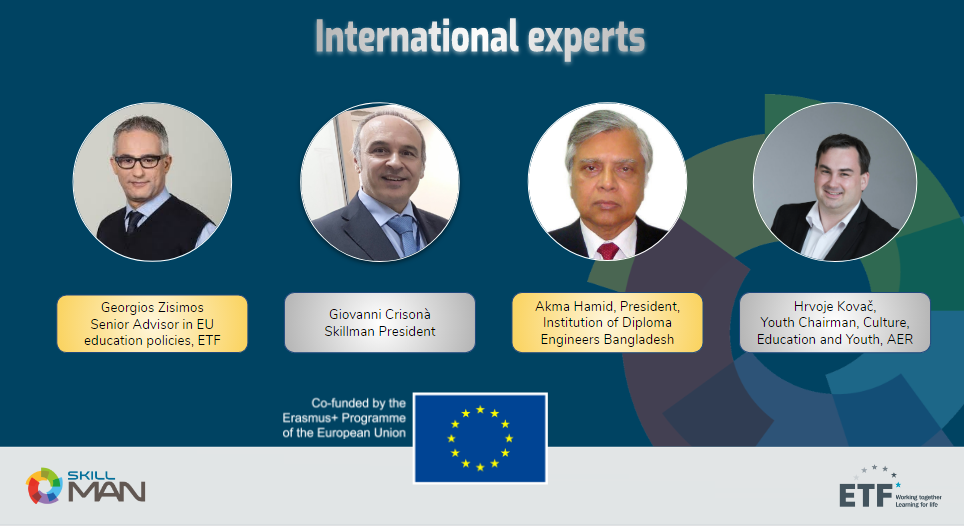
Mr. Georgios Zisimos, senior specialist in EU education and training policies at the European Training Foundation (ETF), presented the ETF approach to build regional skills ecosystems through a Network of Centers of Vocational Excellence in their partner countries. This topic was further strengthened by Mr. Giovanni Crisonnà, Skillman leader, who presented the Skillman approach to Global Centres of Vocational Excellence (CoVEs) and its Self Assessment Tools.
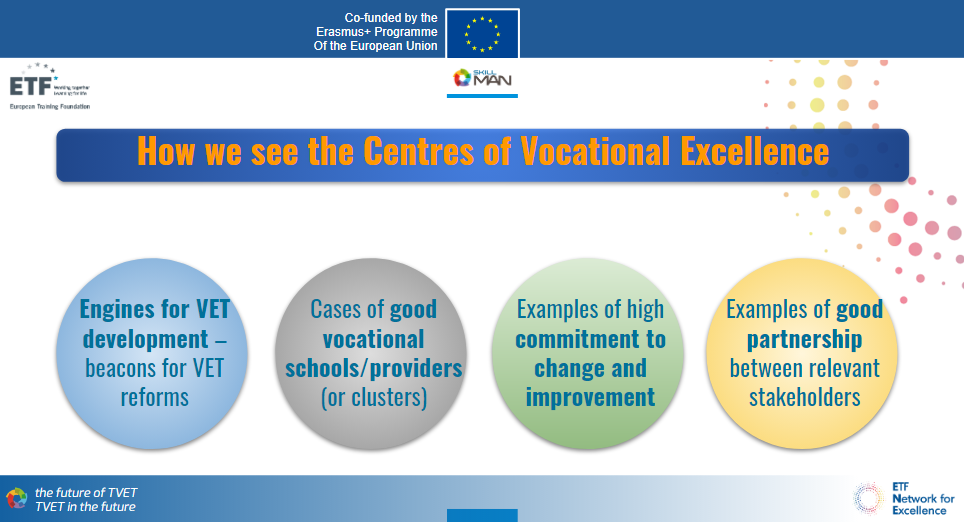
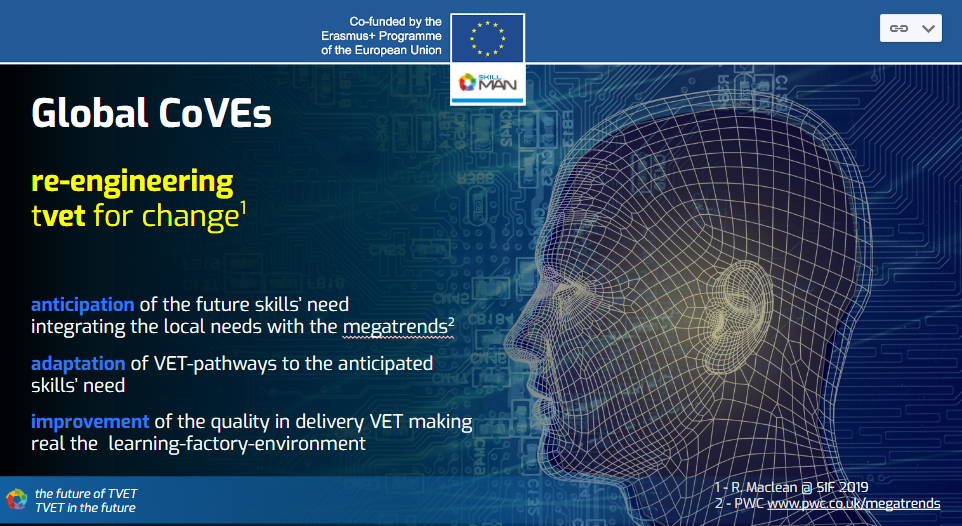
Insights about mutual learning on skills development among European regions were given by Mr. Hrvoje Kovač, Youth Chairman in the Committee for Culture, Education and Youth of the Assembly of European Regions and Deputy Mayor of the Town of Lepoglava in Varaždin County in Croatia.
Furthermore, potential cooperation windows with non-EU countries were addressed during the webinar by Mr. Akma Hamid, President of the Institution of Diploma Engineers Bangladesh (IDEB), which is the largest professional organization in the country and which is dedicated to knowledge advancement and skills development.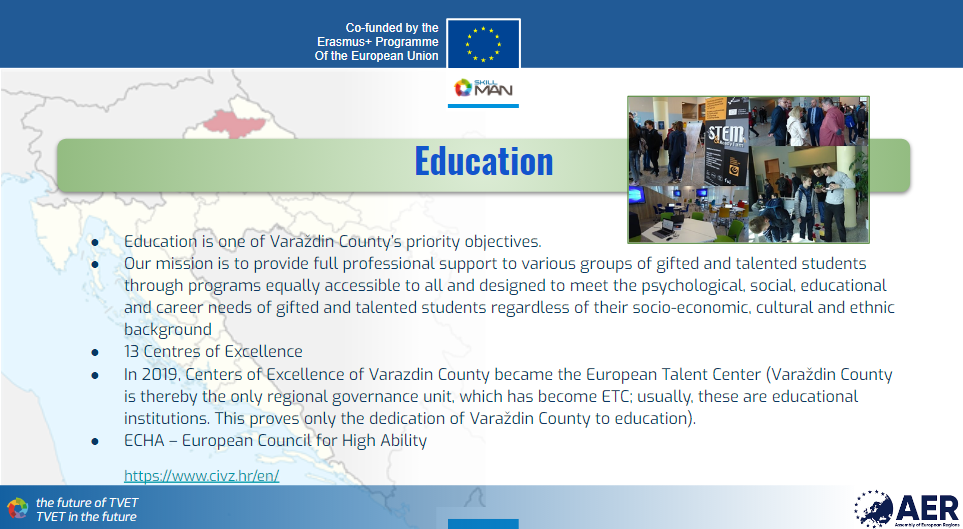
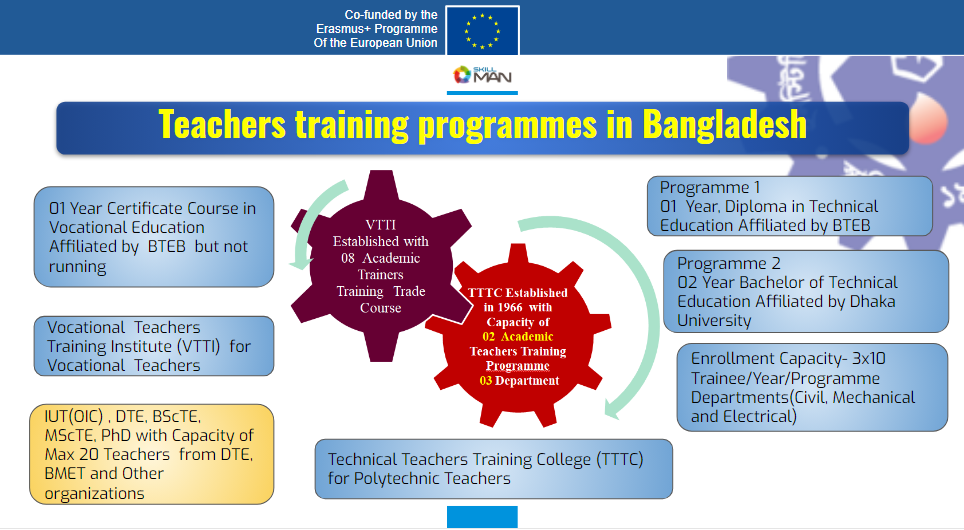
The Skillman network actively promotes and shares initiatives with European/ non-European policymakers with the ultimate objective of investing in people, their skills, and their knowledge to respond to global challenges, maintain social fairness and drive global competitiveness. Riding the wave of transnational mobility and upgrading professional training, the webinar can be considered a part of a longer brainstorming process, which foresees the involvement of key stakeholders with the objective to draft bottom-up policy papers through dedicated, and already established, Peer Learning Clubs (PLCs). Step up with your organization, by subscribing to the following workspaces.
Peer Learning Club 1- Advanced Manufacturing Sector: Subscribe
Peer Learning Club 2- Advocacy & Policy Influencing: Subscribe
Peer Learning Club 3- Work-based learning and standards: Subscribe
Peer Learning Club 4- Train the Trainers: Subscribe
If you are interested in being part of reshaping the future of EU projects, keep up with the upcoming Skillman events and become the new protagonist of TVET.
 Intra-Africa
Intra-Africa
- Update on EACEA’s new generation of funding programmes 8 January 2021EACEA’s new generation of funding programmes for the period 2021-2027 has now been politically agreed. EACEA’s funding programmes for this period will be: Erasmus+ Creative Europe the European Solidary Corps the Citizenship, Equality, Rights and Values programme (CERV). These programmes will build on the success of their predecessors (Erasmus+, Creative Europe, the European Solidarity Corps and Europe […]
- Intra-Africa Call for proposals EACEA/07/2020 – selection results published 6 November 2020The selection results from the Call for proposals EACEA/07/2020 of the Intra-Africa Academic Mobility Scheme have been published. Link to the selection results
- Information about EACEA’s new generation of funding programmes 15 October 2020EACEA’s funding programmes from 2014-2020 – such as Erasmus+, Creative Europe and Europe for Citizens – will soon come to an end and will be replaced with new programmes for the 2021-2027 period. The legal basis of the programmes for 2021-2027, and the mandate of the Agency, are currently being negotiated by the European Commission […]
- Coronavirus: implications for the Intra-Africa Academic Mobility Scheme 25 March 2020NOTE FOR THE ATTENTION OF THE INTRA-AFRICA ACADEMIC MOBILITY SCHEME CONTACT PERSONS The outbreak of COVID-19 in the EU and in the world has big implications for the Intra-Africa Academic Mobility Scheme. The closure of higher education institutions as well as the broader measures undertaken in many countries to restrict mobility of citizens and increase […]
- Coronavirus: Implications for the implementation of programmes managed by EACEA 25 March 2020Message to the attention of beneficiaries/contractors/experts If the implementation of the project or contracts are impeded by the spread of Corona Virus COVID-19, as a first step the beneficiaries/contractors/experts must inform the Executive Agency (EACEA) by e-mail to the responsible project officer you are usually in contact with or the functional mailbox of the Action […]
- Intra-Africa Academic Mobility Scheme FAQ published 11 March 2020Intra-Africa Academic Mobility Scheme Call for proposals EACEA/07/2020 – Frequently Asked Questions for applicants published
- Information for beneficiaries whose activities are impacted by coronavirus 6 March 2020In the context of the measures taken by national competent authorities to contain the spread of the coronavirus, EACEA has been consulted on the potential effect of such measures on EU funded projects whose implementation could be hindered, or partially / temporarily affected, by mobility restrictions.
- New call for proposals: Intra-Africa Academic Mobility Scheme 2020 19 February 2020Go to the call page
- Selection results: Intra-Africa Academic Mobility Scheme 2019 6 November 2019The new Selection results “Intra-Africa Academic Mobility Scheme 2019” has been published. Go to selection results
- Intra-Africa Academic Mobility Scheme 2018: eForm and User Guide available 21 May 2019Intra-Africa Academic Mobility Scheme (Call for proposals EACEA/03/2019): electronic application form (eForm) and user guide published. Go to call page.